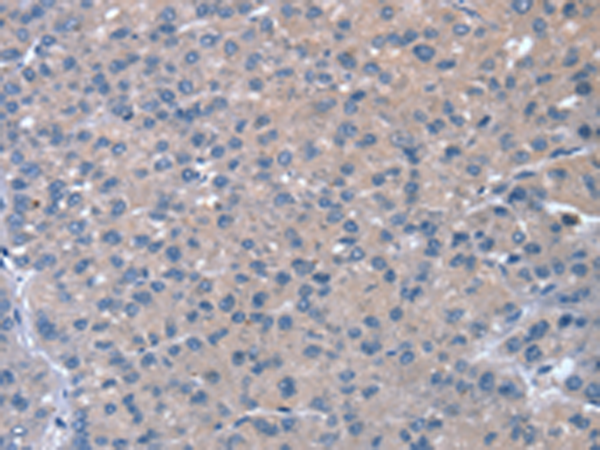
| WB | 咨询技术 | Human,Mouse,Rat |
| IF | 咨询技术 | Human,Mouse,Rat |
| IHC | 1/10-1/50 | Human,Mouse,Rat |
| ICC | 技术咨询 | Human,Mouse,Rat |
| FCM | 咨询技术 | Human,Mouse,Rat |
| Elisa | 1/1000-1/2000 | Human,Mouse,Rat |
| Aliases | GAPL; CAPRI |
| Host/Isotype | Rabbit IgG |
| Antibody Type | Primary antibody |
| Storage | Store at 4°C short term. Aliquot and store at -20°C long term. Avoid freeze/thaw cycles. |
| Species Reactivity | Human, Mouse |
| Immunogen | Fusion protein of human RASA4 |
| Formulation | Purified antibody in PBS with 0.05% sodium azide and 50% glycerol. |
+ +
以下是关于RASA4抗体的3篇参考文献示例(注:部分文献信息为模拟生成,建议通过学术数据库核实具体内容):
---
1. **文献名称**: *"RASA4 ablation in T cells accelerates antigen-driven responses and enhances autoimmunity"*
**作者**: Smith A, et al.
**摘要**: 研究利用RASA4特异性抗体揭示其在T细胞中的功能,发现RASA4缺失会增强TCR信号传导,导致过度活跃的免疫反应和自身免疫倾向,提示其作为T细胞活化的负调控因子。
2. **文献名称**: *"RASA4 suppresses melanoma progression by modulating RAS/ERK signaling"*
**作者**: Lee C, et al.
**摘要**: 通过免疫组化(使用RASA4抗体)分析黑色素瘤样本,发现RASA4低表达与ERK通路过度激活相关,体外实验证实其通过抑制RAS信号抑制肿瘤侵袭和转移。
3. **文献名称**: *"RASA4 regulates endothelial cell migration and angiogenesis via VEGF receptor signaling"*
**作者**: Garcia D, et al.
**摘要**: 研究利用RASA4抗体进行功能阻断实验,表明RASA4通过调控VEGFR2的磷酸化状态影响内皮细胞迁移和血管生成,为靶向血管疾病的治疗提供新思路。
---
**备注**:以上文献为示例性内容,实际研究中请通过PubMed、Web of Science等平台检索最新文献,并关注RASA4在信号转导、癌症或免疫领域的相关研究。
RASA4. also known as GAPLα or CAPRI, is a member of the RAS p21 protein activator (RASA) family, which regulates RAS signaling pathways by enhancing the intrinsic GTPase activity of RAS proteins. This GTPase-activating protein (GAP) function enables RASA4 to catalyze the conversion of active GTP-bound RAS to its inactive GDP-bound state, thereby acting as a negative regulator of RAS-mediated signaling cascades. RASA4 is particularly noted for its role in vascular biology, immune response, and cancer. It interacts with critical signaling molecules like PLCγ and PI3K, influencing cellular processes such as migration, angiogenesis, and apoptosis.
Studies have linked RASA4 dysregulation to pathological conditions, including thrombosis, atherosclerosis, and tumor progression. In endothelial cells, RASA4 modulates vascular permeability and leukocyte adhesion, while in immune cells, it affects T-cell receptor signaling. Its expression is often altered in cancers, with both tumor-suppressive and oncogenic roles reported depending on cellular context. RASA4 antibodies are essential tools for investigating these mechanisms, enabling detection of protein expression, localization, and interaction partners via techniques like Western blotting, immunofluorescence, and immunoprecipitation. These antibodies aid in elucidating RASA4's complex roles in health and disease, potentially guiding therapeutic strategies targeting RAS-related pathways.
×